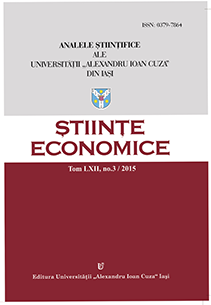The tendency towards secondarity in managing global imbalances
The tendency towards secondarity in managing global imbalances
Author(s): Lucian CroitoruSubject(s): Supranational / Global Economy, Business Economy / Management, Economic policy, Transformation Period (1990 - 2010), Present Times (2010 - today)
Published by: Editura Universităţii »Alexandru Ioan Cuza« din Iaşi
Keywords: Global saving glut; global imbalances; secondarity; current account balance; natural interest rate; real interest rate trends; monetary policy; yield curve; liquidity trap; debt trap; Romanian conundr
Summary/Abstract: In this study, we analyse the factors that have led to the fall of real interest rates on the long term. We show that this tendency, i.e. the fall in real interest rates, which began three decades ago in developed countries is well explained by the emergence and growth of the global saving glut. We formulate the hypothesis according to which the increase in the global excess saving is mostly the result of a process whereby countries place themselves on a secondary position vis-à-vis the US (i.e. secondarity) with regard to taking and managing risks which occur after a crisis. The ensuing peculiarity of global excess saving is that it is generated in an increasing number of countries or economic areas, with the overwhelming part located in a few of them, while the overwhelming part of the global deficit of savings is located in the US. Secondarity is caused both by governments, which have sought to move to excess saving, as was the case of Asian countries (Bernanke, 2005), or to capping budget deficits, as it happened in the Eurozone and in the EU, and by the free choice of every economic agent in the private sector. Secondarity represents a major cause for a vicious circle in which the decline in interest rates to ever lower levels has led to the emergence of financial bubbles, whose bursting requires the further reduction of interest rates, thus generating new bubbles and so on and so forth. Misinterpreted in real time as the “Great Moderation”, this vicious circle went unobserved.
Journal: Analele Ştiinţifice ale Universităţii »Alexandru Ioan Cuza« din Iaşi. Ştiinţe economice
- Issue Year: 62/2015
- Issue No: 3
- Page Range: 291-311
- Page Count: 21
- Language: English

